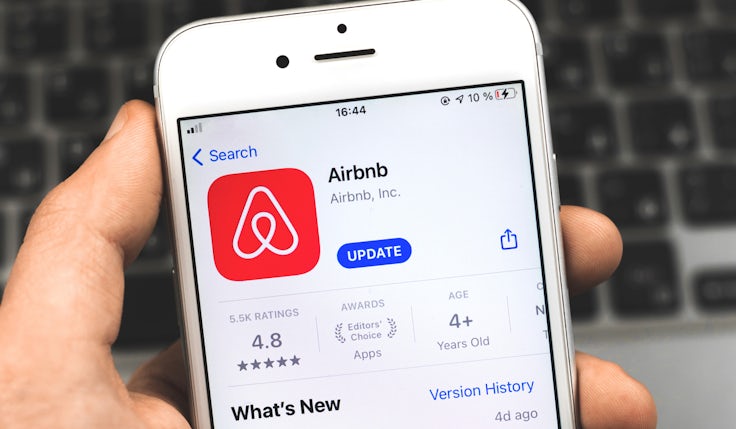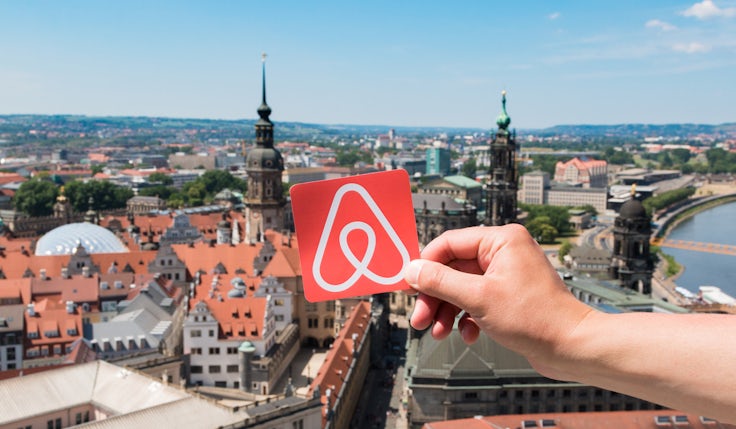Airbnb CFO: We were right to shift spend from performance to brand-building
Citing PR as its “most important channel”, Airbnb will continue to invest the bulk of its marketing spend in brand-building in 2022 as it looks to attract new hosts and support innovation.
Airbnb has reported its “strongest ever” fourth quarter results, driven by higher revenue and increased marketing efficiency.
Net profit reached $55m (£40.6m) over the three months to 31 December, compared with a net loss of $3.9bn (£2.9bn) over the same period in 2020. Total revenue for the quarter was $1.5bn (£1.1bn), exceeding 2019 by 38%.
At the same time, overall sales and marketing expenses decreased 44% year-on-year to $351m (£259m), reflecting continued reductions in performance marketing spend year-on-year.
Excluding the impact of stock-based compensation and other non-cash or one-time items, sales and marketing expense increased by 119% to $324m (£239m), “due primarily to an increase in brand marketing expense”.
The travel accommodation business first announced it would be making a permanent cut to its overall marketing investment in February last year, having noted that slashing spend during Covid had little impact on traffic.The 2022 Agenda: Breaking down the wall between brand and performance
“In 2019, before the pandemic, we shifted our marketing strategy to be more brand-driven and even less dependent on search engine marketing,” Airbnb’s chief financial officer Dave Stephenson said on a call with investors last night (15 February).
“We made that shift and it has proven to have been the right shift, not only in 2019 but in 2020 and 2021.”
Last year, CEO Brian Chesky said Airbnb now looks at the role of marketing as one of “education”, not “to buy customers”. Reaffirming that position this week, Chesky added that performance marketing is thought of as a “laser” to home in on balancing supply and demand.
The business launched its first large-scale brand marketing campaign in five years in early 2021, ‘Made Possible by Hosts’. New ads were launched over the autumn to “continue the momentum” of the campaign. During the fourth quarter, overall traffic to the Airbnb platform increased almost 20% in the seven countries where the campaign ran, compared to the final quarter of 2019. This was “significantly” ahead of non-campaign countries, the business has claimed.
We believe that Airbnb can be much more than a marketplace that merely connects guests and hosts.
Brian Chesky, Airbnb
However, nearly 90% of Airbnb’s traffic remains direct. According to Chesky, this can be explained by the more than half a million press articles published about Airbnb last year alone.
“PR is actually probably the most important channel to build the brand of Airbnb,” he said. “That’s because Airbnb has an offering that’s really unique, and so people are deeply passionate about it, they tell one another and Airbnb has become a noun and a verb used all over the world.”
Marketing in 2022
Looking ahead to the next financial year, sales and marketing spend as a percentage of revenue is expected to remain flat, Stephenson said, with a continued focus on investing more in brand and less in search engine marketing.
“We achieved a new baseline in our marketing expense as a percentage of revenue in 2021, so there isn’t as much opportunity for improvement in that particular line item going forward,” the Airbnb CEO explained.
“We’re seeing great success in the brand marketing that we did last year and we’re going to be expanding it to more countries. To the extent that we expand into additional countries, there will be some incremental more brand marketing spend in this year.”Airbnb hails early results from shift to brand building over performance marketing
Chesky added that there will be “a little more” investment in the building the brand from a hosts perspective.
“Very few people at this point who travel regularly and book travel on the internet don’t know about Airbnb. But we don’t think enough people know about the incredible economic benefits to hosting and what it brings to people’s lives,” he said.
In the fourth quarter Airbnb launched new host-focused ad campaign ‘Strangers’, with the aim of getting more hosts onto the platform. The ad features three unusual-looking, animalistic guests in an Airbnb listing, before before explaining that ‘strangers aren’t that strange’ after all.
To continue raising awareness of hosting, Airbnb also launched digital campaigns focused on recruitment, with traffic to its host landing page in campaign countries increasing by nearly 40% compared to the fourth quarter of 2019.
Plans for innovation
Airbnb also plans to use its brand marketing spend to support some “big” product innovations launching this year, Chesky said.
Last year, the business redesigned the ‘host onboarding flow’ to make it easier for new hosts to get started, introduced its ‘Ask a Superhost’ programme and created AirCover top-to-bottom protection, free for every Airbnb host.
The brand has also been working to simplify the guest experience, introducing ‘I’m Flexible’, a new way to search on the Airbnb platform without time and date restrictions which has been used nearly 800 million times in the last year.
“But it’s important to note we are not stopping here because in 2022 and beyond, what we’re going to do is accelerate our pace of innovation,” Chesky said.
Very few people at this point who travel regularly and book travel on the internet don’t know about Airbnb.
Brian Chesky, Airbnb
These innovations will focus on three priorities. The first priority is about making it easier for guests to live on Airbnb, as the platform has seen lengths of stays increase and people using site to travel while staying for weeks, months, or even entire seasons at a time.
The second is to “unlock the next generation” of hosts by “systematically” tackling obstacles raised by people who are thinking about hosting. The third and last priority is to become the “ultimate host”.
“We believe that Airbnb can be much more than a marketplace that merely connects guests and hosts,” Chesky explained.
“Our goal is to provide the ultimate service to our guests, anticipating their needs and going above and beyond just like a good host. Now, by offering a more personalised service, we can dramatically improve the experience for millions of guests around the world.”






